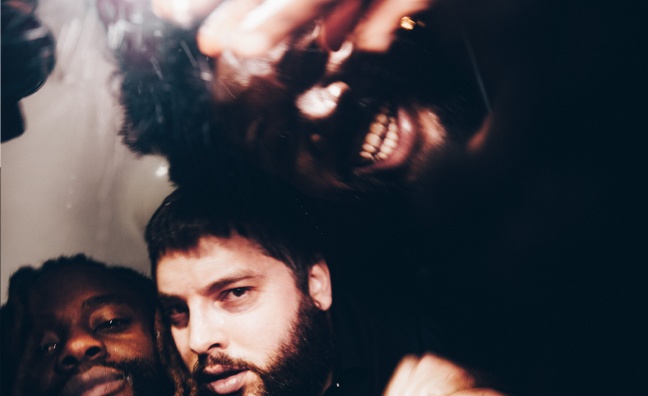As Young Fathers release their fourth album Heavy Heavy (out today - February 3), Music Week meets up with producer and vocalist Graham ‘G’ Hastings to discuss the latest iteration of the Mercury-winning trio’s experimental sonic melting pot…
WORDS: Niall Doherty
This is your first album since Cocoa Sugar in 2018, how did you approach it?
“We made a point of not starting anything until the three of us were in the room together, then we’d start hitting or singing things and making the music. This is our first album where we didn’t have an external producer in the studio, it was just the three of us. We didn’t even have a voice of reason! I think what keeps us together is that feeling of excitement from venturing into the unknown. This record took things from certain kinds of folk music, but not twee folk, indigenous folk and music from around the world like old Alan Lomax records, where the music is driven mostly by the human involved, by their passion and their voice.”
How has the band’s dynamic changed since you formed back in 2008?
“We’re not the same 14-year-old boys anymore. Our dynamic changes, sometimes for the better and sometimes for the worse. Sometimes you don’t know what’s better or worse, because it could be worse personally but better musically or vice versa. We come together just enough to make something happen and we all still lean on each other very much to get the element of surprise with the music. If you’re going to do something new, it should surprise you in some way, you should feel that you’re onto something else. The dynamic changes daily. A lot of bands would’ve split up over creative differences, whereas we try and rein them in.”
And how does all that feed into your relationship with Ninja Tune?
“They just leave us! They trust us. It’s good to have that trust, it’s one less thing for us to deal with. We’ve never had A&R, we’ve never had anyone from the label come to see us mid-album or anything. They always trust us, even with the art side of things, the artwork and the direction of videos. It’s the best situation for us because we can do it and we’ve done it over and over again.”
Having had the mainstream exposure from the Mercury Prize, what have you learned about navigating the music industry?
“Music is so industrialised now, every aspect of it is very industrialised. It’s not like the old model, it’s not just a conveyor belt for pop anymore, it’s crossed all areas, even into alternative and underground music. Trying to break that formula is where I get off. That conveyor belt can make life easier but it also dilutes, artistically. It feels like it’s harder to break out, it’s harder to kick back a bit – no one’s encouraging it unless you’re doing it yourself.”
So is it up to Young Fathers to fight against that?
“The main battle for us has always been after the album is done, when we go face-forward to the industry. It’s about trying to be stubborn and knowing that the whole thing is about what we are as a group. Every day it’s a battle and then you’ve got the moral decisions to make. You just try and do your best because you have to be seen to be heard. We’re a band who need the press, we’re not the size where we can just operate on our own and expect everybody to hear it. The kind of music we make is not typical, so you’re already at the mercy of being missed. But if [we ever risk] diluting that, it’s like, ‘Well, what’s the fucking point?’ Because then you’re just like anything else.”









